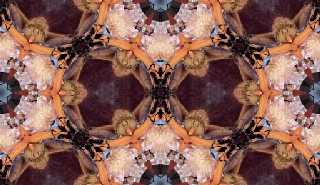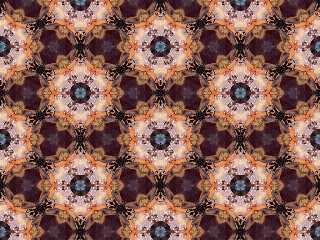 |
 |
|
 |
|
 |
|  |
|  |
|
 |
|
 |
|  |
|  |
|
 |
There have been other povfiles written to create seamless tiles, but I
think the one I'm working on is a bit different. I'm posting a sample
of it's output.
The povfile (a small group of files, actually) takes an existing
image, slices it up, makes several copies of the slice, and arranges
them in a kaleidoscopic pattern. It can generate tiles based on
square, triangular, and hexagonal patterns. The example you see here
is triangular. It also generates 36 different output images for each
input image, giving you a nice variety to choose from.
Does anyone think it's interesting, or am I the only one? :)
later,
Glen Berry
Post a reply to this message
Attachments:
Download 'Tile_Sample.jpg' (41 KB)
Download 'Wallpaper.jpg' (212 KB)
Preview of image 'Tile_Sample.jpg'

Preview of image 'Wallpaper.jpg'

|
 |
|  |
|  |
|
 |
|
 |
|  |
|  |
|
 |
Very nice. I'd love to see the code so I could animate it.
Good work!
D.
"Glen Berry" <7no### [at] ezwv com> wrote in message
news:ftd9fvcnfksdb209qqvudb7kiugug6grp5@4ax.com...
> There have been other povfiles written to create seamless tiles, but I
> think the one I'm working on is a bit different. I'm posting a sample
> of it's output.
>
> The povfile (a small group of files, actually) takes an existing
> image, slices it up, makes several copies of the slice, and arranges
> them in a kaleidoscopic pattern. It can generate tiles based on
> square, triangular, and hexagonal patterns. The example you see here
> is triangular. It also generates 36 different output images for each
> input image, giving you a nice variety to choose from.
>
> Does anyone think it's interesting, or am I the only one? :)
>
>
> later,
> Glen Berry
>
> com> wrote in message
news:ftd9fvcnfksdb209qqvudb7kiugug6grp5@4ax.com...
> There have been other povfiles written to create seamless tiles, but I
> think the one I'm working on is a bit different. I'm posting a sample
> of it's output.
>
> The povfile (a small group of files, actually) takes an existing
> image, slices it up, makes several copies of the slice, and arranges
> them in a kaleidoscopic pattern. It can generate tiles based on
> square, triangular, and hexagonal patterns. The example you see here
> is triangular. It also generates 36 different output images for each
> input image, giving you a nice variety to choose from.
>
> Does anyone think it's interesting, or am I the only one? :)
>
>
> later,
> Glen Berry
>
>
Post a reply to this message
|
 |
|  |
|  |
|
 |
|
 |
|  |
|  |
|
 |
On Sat, 21 Jun 2003 16:13:07 -0400, "Dennis Miller"
<dhm### [at] attbi com> wrote:
>Very nice. I'd love to see the code so I could animate it.
>Good work!
>D.
Yeah, I've been thinking about what this effect would do to a piece of
video. It might be fun to apply this to every frame in a video and see
what sort of coma-inducing patterns emerge. :)
When I get the code tidied up and improved a bit more, I'll share it
with you.
later,
Glen Berry com> wrote:
>Very nice. I'd love to see the code so I could animate it.
>Good work!
>D.
Yeah, I've been thinking about what this effect would do to a piece of
video. It might be fun to apply this to every frame in a video and see
what sort of coma-inducing patterns emerge. :)
When I get the code tidied up and improved a bit more, I'll share it
with you.
later,
Glen Berry
Post a reply to this message
|
 |
|  |
|  |
|
 |
|
 |
|  |
|  |
|
 |
Glen Berry wrote:
> There have been other povfiles written to create seamless tiles, but I
> think the one I'm working on is a bit different. I'm posting a sample
> of it's output.
>
> The povfile (a small group of files, actually) takes an existing
> image, slices it up, makes several copies of the slice, and arranges
> them in a kaleidoscopic pattern. It can generate tiles based on
> square, triangular, and hexagonal patterns. The example you see here
> is triangular. It also generates 36 different output images for each
> input image, giving you a nice variety to choose from.
>
> Does anyone think it's interesting, or am I the only one? :)
>
>
> later,
> Glen Berry
>
>
Can you make the kaleidoscope move in a nice way? For an animated texture?
--
Dedicated to audio/visual and interactive artwork.
http://www.geocities.com/simonlemieux/
Post a reply to this message
|
 |
|  |
|  |
|
 |
|
 |
|  |
|  |
|
 |
On Sat, 21 Jun 2003 16:23:19 -0400, Xilo Musimene <xil### [at] hotpop com>
wrote:
>Can you make the kaleidoscope move in a nice way? For an animated texture?
I would either need to modify the code that selects the exact slice of
the original image that is used for tiling, or you would need to feed
the code a series of frames from a live-action video or animation.
There is also the notion of using color-cycling for an animated
effect, but I'm not sure I could pull that off using only POV. Some of
the 256-color fractal programs used this trick. It might look really
wild combined with one or both the methods mentioned above.
For the record, my povfile outputs are true-color, not 256 color
images. If you want to experiment with color-cycling, the images
probably need to in 256 color mode.
I'll see what I can do to make my current source files a little more
animation friendly.
later,
Glen Berry com>
wrote:
>Can you make the kaleidoscope move in a nice way? For an animated texture?
I would either need to modify the code that selects the exact slice of
the original image that is used for tiling, or you would need to feed
the code a series of frames from a live-action video or animation.
There is also the notion of using color-cycling for an animated
effect, but I'm not sure I could pull that off using only POV. Some of
the 256-color fractal programs used this trick. It might look really
wild combined with one or both the methods mentioned above.
For the record, my povfile outputs are true-color, not 256 color
images. If you want to experiment with color-cycling, the images
probably need to in 256 color mode.
I'll see what I can do to make my current source files a little more
animation friendly.
later,
Glen Berry
Post a reply to this message
|
 |
|  |
|  |
|
 |
|
 |
|  |
|  |
|
 |
Thanks much. Look forward to that!
Best,
D.
"Glen Berry" <7no### [at] ezwv com> wrote in message
news:r3f9fvoak7ipt42jgcmmm0b12a9pipq6vq@4ax.com...
> On Sat, 21 Jun 2003 16:13:07 -0400, "Dennis Miller"
> <dhm### [at] attbi com> wrote in message
news:r3f9fvoak7ipt42jgcmmm0b12a9pipq6vq@4ax.com...
> On Sat, 21 Jun 2003 16:13:07 -0400, "Dennis Miller"
> <dhm### [at] attbi com> wrote:
>
> >Very nice. I'd love to see the code so I could animate it.
> >Good work!
> >D.
>
> Yeah, I've been thinking about what this effect would do to a piece of
> video. It might be fun to apply this to every frame in a video and see
> what sort of coma-inducing patterns emerge. :)
>
> When I get the code tidied up and improved a bit more, I'll share it
> with you.
>
> later,
> Glen Berry com> wrote:
>
> >Very nice. I'd love to see the code so I could animate it.
> >Good work!
> >D.
>
> Yeah, I've been thinking about what this effect would do to a piece of
> video. It might be fun to apply this to every frame in a video and see
> what sort of coma-inducing patterns emerge. :)
>
> When I get the code tidied up and improved a bit more, I'll share it
> with you.
>
> later,
> Glen Berry
Post a reply to this message
|
 |
|  |
|  |
|
 |
|
 |
|  |
|  |
|
 |
Good idea. Would you be able to make it a GIMP plugin ?
That would be great !
JC
Glen Berry wrote:
> There have been other povfiles written to create seamless tiles, but I
> think the one I'm working on is a bit different. I'm posting a sample
> of it's output.
>
> The povfile (a small group of files, actually) takes an existing
> image, slices it up, makes several copies of the slice, and arranges
> them in a kaleidoscopic pattern. It can generate tiles based on
> square, triangular, and hexagonal patterns. The example you see here
> is triangular. It also generates 36 different output images for each
> input image, giving you a nice variety to choose from.
>
> Does anyone think it's interesting, or am I the only one? :)
>
>
> later,
> Glen Berry
>
>
Post a reply to this message
|
 |
|  |
|  |
|
 |
|
 |
|  |
|  |
|
 |
On Mon, 23 Jun 2003 09:04:27 +0200, "JC (Exether)" <no### [at] spam fr> wrote:
>Good idea. Would you be able to make it a GIMP plugin ?
>That would be great !
I wouldn't be able to, because I don't know how to write GIMP plugins.
Assuming that GIMP can crop and rotate with the same precision that
POV can, and I think it probably can, it should be possible to write
an equivalent GIMP plugin.
What I'd really like is to have a GUI interface, where you move a
cursor representing the image slice over your original image while
watching a preview of the output generated in real time. That would
probably require some C/C++ programming for best results, and it's
beyond my abilities at the moment.
later,
Glen Berry fr> wrote:
>Good idea. Would you be able to make it a GIMP plugin ?
>That would be great !
I wouldn't be able to, because I don't know how to write GIMP plugins.
Assuming that GIMP can crop and rotate with the same precision that
POV can, and I think it probably can, it should be possible to write
an equivalent GIMP plugin.
What I'd really like is to have a GUI interface, where you move a
cursor representing the image slice over your original image while
watching a preview of the output generated in real time. That would
probably require some C/C++ programming for best results, and it's
beyond my abilities at the moment.
later,
Glen Berry
Post a reply to this message
|
 |
|  |
|  |
|
 |
|
 |
|  |
|
 |




![]()